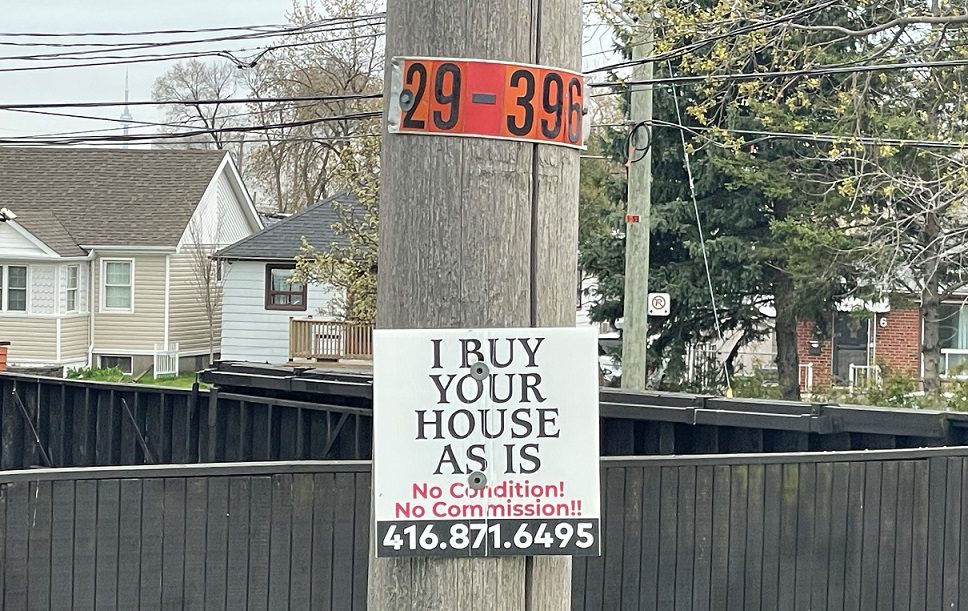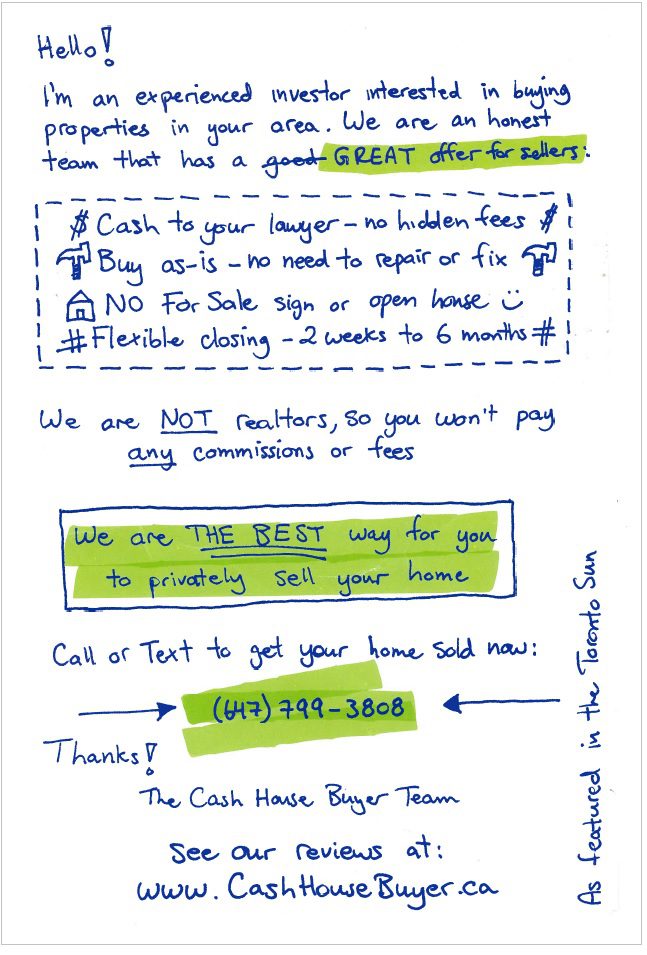How did you find your Realtor when it came time to sell your home?
Did you ask your parents? Once upon a time, this was the go-to for first-time buyers or sellers.
“Mom, Dad, we’re thinking about buying a home. Who’s your ree-la-tour? Can you give us her office number?”
Maybe that was back when phone numbers only had seven digits…
I think most people have and continue to find agents through word-of-mouth. “Referrals,” as they’re called.
“You’re looking for a house? You should talk to my guy, Jimmy. He’s the best!”
But many people find their Realtor online, either by directly searching and browsing through Google, or by randomly emailing on a property, meeting an agent, and thinking, “I could work with this gal.”
Some people walk into an open house and get “picked up” by the Realtor on site.
Does anybody still look at real estate listings in the newspaper? Yes? No? The Globe & Mail has a big feature on Saturday and a lot of agents and brokerages still advertise. I’m type-casting here, but the only people who have ever called me on a Globe ad are older folks. But then again, who’s reading the newspaper on a Saturday?
Who picks their agent from a billboard? Or a bus shelter?
Who gets a notepad in the mail with an agent’s face on it and says, “That is who I want representing me”?
Who hears an advertisement on the radio and decides to call that guy?
There are all kinds of ways to find a real estate agent and while I want to say “There’s no wrong or right way,” I think that there is.
At the very least, there’s a wrong way.
And if you’re looking to sell your home, you’re bound to come across a lot of really really wrong ways to do so.
I was at the park near my mother’s house on Sunday afternoon and bolted to virtually every telephone pole in the area was an ad like this:

Is this how people find their agent in 2024?
Is this area specific? Is this price specific? Is this demographic-specific?
Call me crazy here, but I’m wired to see a sign like that and think “scam.”
I’m going to see this as a shortcut, or a scheme, or a red flag.
I’m going to continue to subscribe to the logic, “If something seems to good to be true, it probably is.”
That’s not only because I’m a cynic, however. It’s because I’ve lived a lot in my forty-three years, and I just don’t believe in get-rich-quick schemes, or shortcuts to prospertity.
Or maybe I just don’t believe in people?
Wait….maybe I don’t believe in good.
Seriously, though, who calls that sign?
Who sees I Buy Hour House As Is and thinks, “This sounds like a really good idea!”
“No Condition. No Commission.”
Who sees that and thinks, “Hell yeah, this is the way to do business!”
I don’t understand.
If you were to Google the words “cash for homes” or some variation, I’m sure that one of the auto-completes Google chooses would be a word like “scam.”
And yet we continue to see people using them, or worse – calling on a sign like the one above.
I’m also sure that you have received a flyer in your mailbox just like this one:

A blog reader sent me this a year ago and said, “You should really blog about these flyers!”
It’s been in the blog queue since then.
But it wasn’t until I saw that sign on the telephone pole near my mom’s house that I realized, she’s right. I should blog about this. Not only that, a blog post with a title like today’s is eventually going to rank highly on Google, and I feel like I’ll be doing my part to warn people about these scams.
Maybe not all of these are scams, and I can’t speak specifically about the flyer above.
But I’ve talked to reporters who have studied this (and interviewed home sellers) as well as economists and other industry members who know the ins and outs, so today, I want to speak generically about how these “cash for homes” offers work.
For simplicity, I’ll break it down into steps…
–
Step 1: Make The Market Seem Difficult
We’re in Toronto. It’s the hottest market on the planet, right?
And yet most of these advertisements are making the prospect of a sale look daunting.
“Without the hassle of staging,” the flyers read, even though staging is proven to get more money for properties.
“No repairs needed,” say the flyers, even though repairs also help to increase the value of a house.
“No open houses,” is likely appealing to people who are afraid of others coming into their homes, even though open houses are a great way to get foot traffic through. And you do want foot traffic, right? I mean, the goal is to maximize the value of a house?
“Quick closing,” they advertise, as though closing periods in Toronto are all nine months.
“No hidden fees,” they warn, even though a traditional real estate sale has no hidden fees, and it’s actually these “cash for homes” buyers who hide all kinds of things!
Bottom line – the goal here is to attract people who are afraid, or make people afraid, and then prey on them.
–
Step 2: Make Them An Offer They Can’t Refuse
If you were to assume that these “cash buyers” aren’t charity workers, and they aren’t missionaries or representatives of the Ontario Lottery and Gaming Corporation, then clearly there must be something in this for them?
Maybe, just maybe, they’re going to offer less than fair market value?
I know that it’s naive of me to suggest, “People should know this,” but the guy sending fake-hand-written letters to houses looking to buy homes in as-is condition, and put **$$CASH$$** in your pocket probably isn’t the most upstanding individual in the real estate industry.
Then again, who is?
These flyers don’t just pray on the unsophisticated but they pray on the elderly who can’t imagine how quickly home values have risen, and for somebody that paid $150,000 for their house thirty years ago, and was told that it was worth $1,200,000 five years ago, they probably still think it’s worth $1,200,000 today.
–
Step 3: Limited Time Offer
These deals are usually done in person and that’s dangerous for the home seller.
The home seller is no match for somebody who makes a living buying houses from unsuspecting home-owners for less than fair market value, and what’s worse is that they usually come with a time limit.
“I would love to walk you through all this, but I have four other houses to visit today and I need to make my decision now.”
“I understand that you need to talk this through with your family, but unfortunately, I’m only buying one house this week and I have other home-owners to meet today.”
You can imagine.
–
Step 4: Renegotiate
Let’s say that a house is worth $700,000.
And let’s say that a “cash for homes” buyer is able to swindle a home-owner into signing an agreement for $615,000.
What’s to stop the buyer from coming back in a week and asking for an abatement on price?
By this point, the home-owner is already making plans.
Many of these sellers have financial problems and the prospect of being free of the weight of the world is the best thing they’ve felt in years!
But now, the buyer comes back and says, “I’m sorry, but I’ve sat down and gone over the recent sales in the area and my evaluation, and I can’t pay $615,000 for this house, but I would do $580,000.”
Many of these sellers go for it.
And if they don’t, the buyer still has a sweetheart deal.
Why can the buyer go back and renegotiate?
Because the offer has conditions. That initial offer is likely conditional and the buyer has an “out.”
Speaking of conditions, the biggest one is yet to come…
–
Step 5: Assignment
Here’s how these “cash for homes” buyers make their money.
These people don’t actually want to buy houses. They don’t want to close. Heck, I bet many of them can’t afford to!
But what they want to do is find somebody who does want to close, and then assign the Agreement of Purchase & Sale to them.
In the case above where somebody bought a $700,000 house for $615,000 (or $580K if the seller accepted the abatement), the cash for homes buyer looks to assign the APS to somebody else.
If a $700,000 house is bought for $580,000 and then assigned for $650,000, then the cash for homes buyer makes $70,000, and the end-user buyer gets a house for a $50,000 discount.
Everybody wins, right?
Oh, except the home owner who called on the flyer…
Scams are getting more and more advanced in today’s day-and-age and I personally fear where A.I. could take all of this.
We’re not far off from the technology that could have your dad call you on FaceTime and ask you to send him money. Except that’s not your dad. Even though it’s him on the screen and it’s his voice, it’s just a computer with somebody pulling the strings behind the scenes.
I routinely tell my mom and dad that everything is a scam – until it’s not.
Any email, text message, phone call, or letter you receive is a scam – until it’s not.
Don’t ever give your personal information away. No matter who’s calling.
I get calls from people at TD Bank or the like and they say, “I need to verify your identity, can you please start by giving me your home address?”
Um, no.
You called me. Why are you asking me for something?
But not everybody is as cynical as I am, and unfortunately, people get scammed all the time.
What do you think when you hear about a woman who lost her life savings because somebody in India called and pretended to be from the Canada Revenue Agency?
You feel bad, right?
But when you hear that somebody from the CRA told her to take out $1,000 per day in cash, go to a Bitcoin machine, and transfer the money, does your opinion change?
We still feel bad, but we wonder why! And how!
We’re angry, of course. We’re hard-working, law-abiding, tax-paying citizens and we see somebody else, just like us, getting taken advantage of.
But how does a person prepare for that? How can we teach everybody not to be scammed?
That’s what I think when I see these real estate flyers, but I’m in the business. I get it. I know how to sell real estate for top dollar, but I also know that there’s no house in Toronto that’s “unsellable” to the point where somebody needs a cash buyer to swoop in and save the day.
I was in the middle of writing this blog today, and Chris told me there was a story in “GO PUBLIC” about the scam.
Here’s the article from last year:
“Ontario Woman Says Using ‘Cash For Houses’ Company Was Costly Mistake”
CBC News – Go Public
October 23rd, 2023
A few bullet points from the article:
*The website promised other advantages, too — “more cash” in a seller’s pocket, a quick closing date, no Realtor fees and it claimed homeowners sometimes get a cheque “the very same day!”
*Chow produced a contract and offered $575,000. Thompson says she peered over his shoulder as he read through it speedily and encouraged her to sign on the spot. But Chow didn’t buy Thompson’s house at all. He secured the option to sell it to someone else before the March 31 closing date — two and a half months later — at a potentially higher price.
*It’s called an “assignment” contract — the house can be sold to another buyer before the closing date. In Ontario, and across the country, all residential real estate contracts can be assigned to another buyer unless there’s a clause explicitly stating that isn’t allowed.
*Thompson knew $575,000 was below market value, but says she figured it was worth the trade-off of getting cash fast, without the hassle of numerous open houses. The next day, though, Chow cancelled the contract and renegotiated for $550,000.
*Three weeks later, Chow flipped the house to new buyers, who paid $610,000 – $60,000 more than Thompson’s contract, which he pocketed.
This sounds a hell of a lot like what I just described above!
And my good friend, Ben Rabidoux, was interviewed for the article.
“Make sure that what you’re signing is actually what you think it is,” Ben said.
“Don’t sign anything without a lawyer,” Ben added.
I realize that some could suggest that this blog post is self-promotional. It could be argued that these “cash for homes” buyers are my competition.
But they’re not.
They’re the guys calling you from TD Bank saying that your VISA is overdrawn and all your assets are about to be frozen, but if you buy ten $100 gift cards at Wal-Mart and call them back to provide the serial numbers, then they’ll accept that as payment.
Not every licensed real estate agent is perfect.
Not every one is competent.
I make no bones about this on my blog in virtually every post I write.
But this isn’t an “us versus them” blog post.
This is a warning to those who don’t know how the “cash for homes” systems/scams work…..in addition to being entertainment for those who already do. 🙂
































Francesca
at 9:25 am
These cash for homes scams don’t just target elderly people. They also target new immigrants who have no idea how our real market works. Our next door neighbors moved here from India three years ago and needed to sell their apartment for a job move to the USA. The husband found one of these flyers and was actually in the process of seriously entertaining it to not be bothered with staging, renovating and paying realty commission. This was the first property here for them so they honestly thought this was a great deal. We spoke to them and warned them they would probably be low balled on price and that it was in their best interest to use a licensed realtor. Luckily they heeded our warning but how many people actually openly speak about these things with friends, neighbors or family to even be talked out of it? On Monday I believe there were 4-5 stories of scams in the news: dating scams, credit card scams, cryptocurrency scams, ederly fraud. It’s unbelievable how many people are trying to scam you now. So many that’s it’s impossible to even know when things are legitimate. We are in a constant state of hyper awareness as it’s becoming so common.
Grasshopper
at 5:35 pm
They are also targeting people who don’t like realtors or lawyers. There are people who are so dead set against using a realtor that they don’t even consider that they are acting against their own self-interest by going with the CA$H FOR HOUSES! deal.